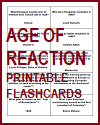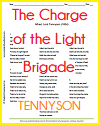It is important for high school World History students studying the Age of Reaction to have a variety of educational experiences to gain a comprehensive and nuanced understanding of this complex period.
Different learning modalities, such as lectures, interactive discussions, multimedia presentations, and hands-on activities, cater to diverse learning styles and keep students engaged.
Analyzing primary sources, such as letters, speeches, and political documents, allows students to develop critical thinking skills and understand perspectives from the time.
Group projects and debates encourage collaboration and deeper exploration of historical arguments and ideologies.
Field trips to museums or virtual tours of historical sites provide tangible connections to the past, making the abstract concepts more relatable.
By experiencing the material in multiple ways, students can better grasp the political, social, and cultural shifts of the Age of Reaction, fostering a more holistic and enduring understanding of history. |









